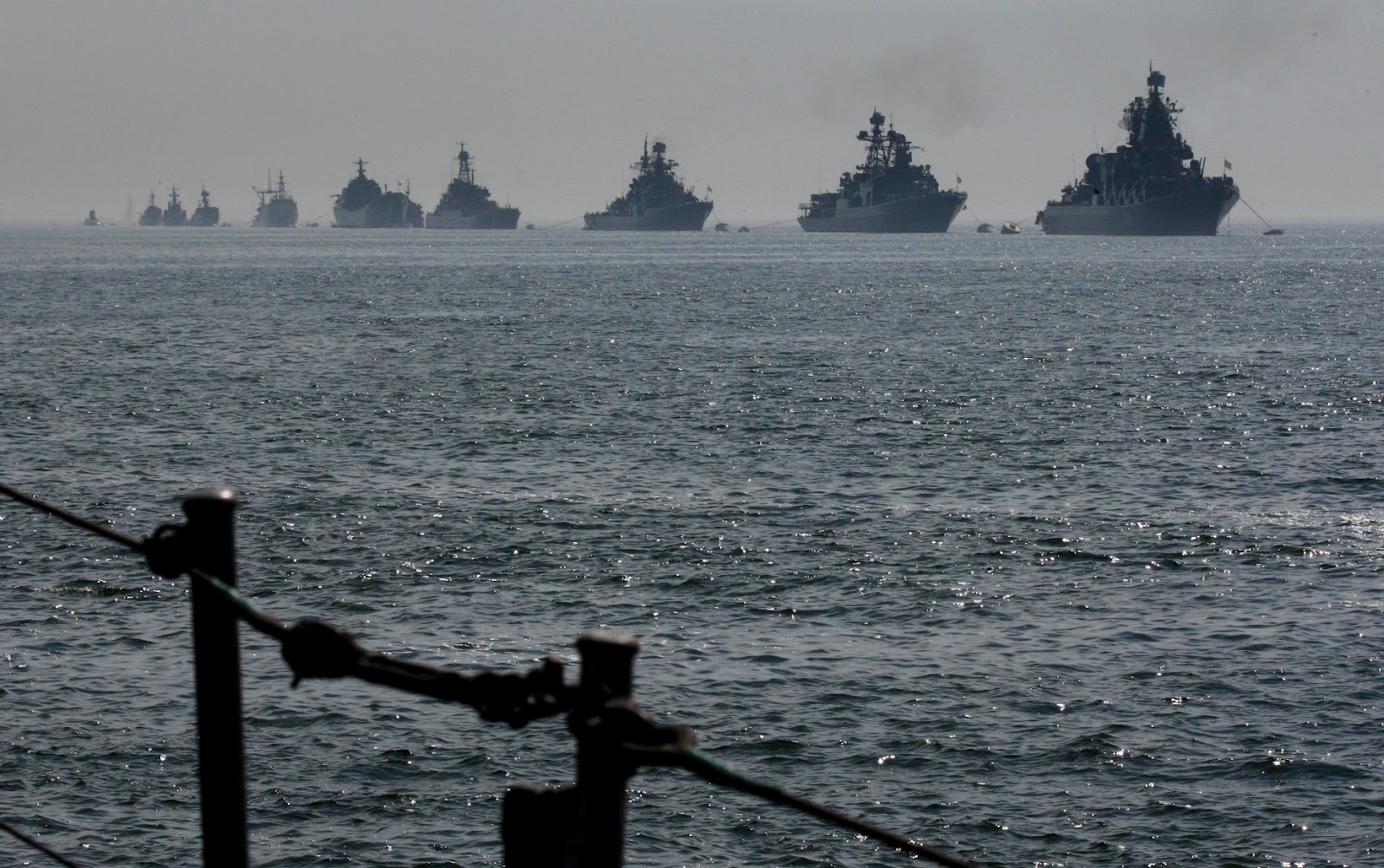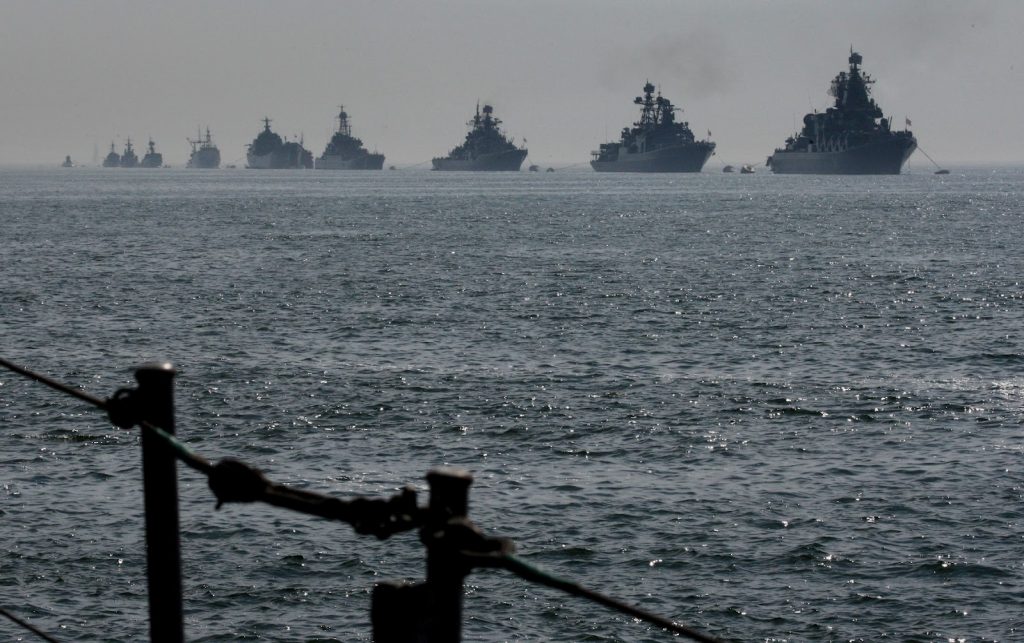Introduction
On Tue 13 Jun 17 the Fleet Battle Staffs (FBS) and the Dartmouth Centre for Seapower and Strategy (DCSS) delivered a conference entitled ‘Resurgent Russia’ at HMS EXCELLENT. Attended by up to 120 people across academia and the military, the conference’s ambition was to highlight Russia’s resurgent role as a ‘global power’ with emphasis on the maritime impacts for the Royal Navy. Funded by DCSS and hosted by the Royal Navy, the conference achieved its aim of prompting debate and critical thought in the ensuing workshops.
The conference was purposely held at an ‘Official’ level and under ‘Chatham House’ rules; this allowed discussion without attribution. It was fully acknowledged that the conference complements wider work strands and in spreading rather than initiating discussions on a resurgent Russia. This note provides a summary of the key issues raised.
Conference Details
Conference Objectives
- Understand Russia’s strategy; with a focus on the implications for the Naval Service.
- Provide a networking opportunity for Service personnel, Academics and Contractors.
- Develop critical and analytical thinking within the Fleet Battle Staffs .
Presentations. The conference started with 30 minute presentations to set the context. The presentations were as follows:
- Dr Graeme Herd : Russian Strategic Culture – what can we learn from Russian activities in the Baltics.
- Dr Andreas Liaropoulos : Russian Information Warfare.
- Dr David Reindorp : Planning issues concerning the Maritime Grey Space.
- Dr Rod Thornton : Russia activity in the Syrian conflict.
- Dr James Bergeron : Russia Maritime Strategy.
- Panel Discussion: Dr Graeme Herd, Dr Thornton and Dr Liaropoulos.
Conference Key Themes
Putin’s leadership. Several of the presentations portrayed Putin as a leader who creates and then exploits crises abroad in order to strengthen/maintain his position domestically. Dr Herd argued that Putin’s CoG was the belief that Russian people needed a strong leader to protect Russia from aggressive foreign powers. There was broad consensus amongst the presenters that Putin’s biggest fear is a coup instigated by Russian elites or a coloured/Arab spring style revolution and that his ultimate succession is far from clear.
Operating within the ‘Grey Space’. Russia has mastered the ability to blur the space between peace and war with belligerent activities that aim to form an ‘alternative truth’. These co-ordinated activities suit Russia’s short decision cycle and whilst heightening tension, invariably fall short of the threshold to warrant a collective NATO response. Plausible deniability is at the heart of information operations that support a disruptive narrative and include cyber operations, fake news, PsyOps, proxy forces, criminal activity and mercenaries. Meanwhile, intelligence services challenge the legitimacy and authority of adversaries, compromising key leaders, obfuscating the clear evidence required to garner decision authority amongst Western democracies and can be rapidly de-escalated to dilute resolve. It is particularly challenging, due to policy and legal constraints, for liberal democracies to counter Russian false narratives/falsehoods. Dr Reindorp highlighted the difficulties that conventional militaries have in planning operations within this ‘grey space’ emphasising the need to caveat traditional reductionist planning tools whilst considering alternatives which can match this increasingly complex norm. He purports to increasing the focus on education and inculcating a mind-set that that instinctively considers a spectrum of activities, including non-kinetic capabilities to counter Russian behaviour.
Increased importance of the Maritime. Dr Bergeron’s presentation emphasised the marked recent increase Russian maritime tempo and investment in new equipment which together have generated considerable interest within NATO. Western strategic outlook has been dominated this century with countering jihadist irregulars acting in the vacuum created in poverty stricken nations without strong governance or rule of law. Whilst the jihadist’s agenda still spreads its shadow far from its source in the Middle East, the global outlook now has the additional pressure with a return to ‘great power’ geopolitics. Revisionist powers are now openly challenging the Western dominated international rules based system that they contend promoted US and European hegemony at their expense. This rivalry is most likely to be expressed at sea.
Russian Maritime Strategy. Dr Bergeron strongly argued that the Russians are implementing their published 2015 Maritime Strategy although this has been tempered by the effect on the economy of depressed oil prices and an underdeveloped defence industrial base. He argued that Russia has effectively deployed a 2 tier Navy with prestigious larger ships, reminiscent of the Soviet Navy alongside a lighter less expensive but highly effective coastal navy equipped with modern systems such as the Kalibr missile. He argued that Russia’s long term strategic focus was on the Arctic High North, with its more immediate focus on the Eastern Med and Black Sea (BS). Repeatedly emphasised was the importance of the Russian Navy in meeting this strategy using all attributes of maritime power and the continued desire to pursue warm water port basing options.
Summary
The conference succeeded in bringing together a wide spectrum of military, MoD civil servants and academics to discuss a resurgent Russia and its implications for the Naval Service. The positive responses and networking opportunities presented by the conference indicate a heightened awareness but represents just one more opportunity to raise the profile of its implications.


